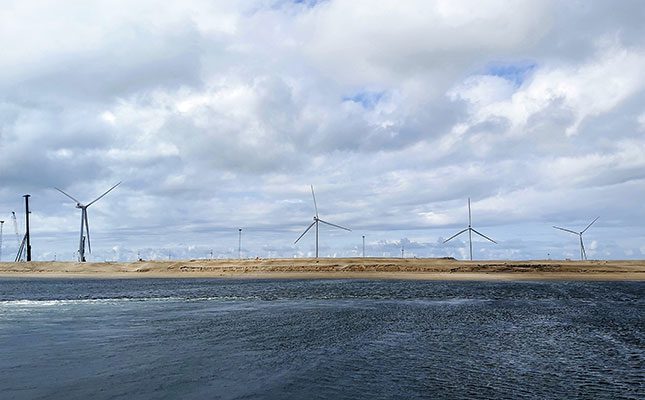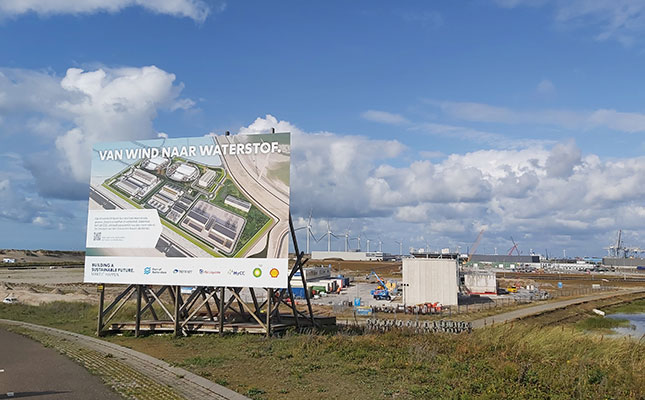International inexperienced hydrogen demand is about to extend sevenfold by 2050. With South Africa possessing all of the substances to make and export hydrogen, the nation may turn into a significant world participant, with advantages even extending to farmers.

Picture: Lindi Botha
The Netherlands’ shoreline is a cool and windy place on the perfect of days. It’s hardly the type of seashore vacation spot South Africans are used to, however it does have monumental advantages: wind energy era.
The Dutch have actually capitalised on this present from nature, and wind generators span throughout the ocean so far as the attention can see. But it surely’s not sufficient.
READ Wind farms: a large alternative for SA’s farmers
Shortly after the Russians declared battle on Ukraine, the EU shunned Russian gasoline. The urgency to scale back carbon emissions has additionally pushed the continent to hunt extra inexperienced vitality, with the Netherlands shutting down their very own gasoline fields final yr.
Erecting sufficient wind generators throughout the North Sea to satisfy their inexperienced vitality necessities, and reworking the principally gas-suited vitality infrastructure, may take as much as 10 years to ascertain, and are available at a substantial value.
Inexperienced hydrogen poses a super answer, however provided that they’ll procure sufficient of it. Inexperienced hydrogen is produced by utilizing renewable electrical energy in an electrolyser to separate water into hydrogen and oxygen.
The Dutch’s consideration has due to this fact shifted south, the place sunshine is considerable, and South Africa’s west coast presents a super location for utilizing desalinated water and photo voltaic vitality to provide hydrogen, which may then be exported by means of purpose-built ports.
Ought to funding in inexperienced hydrogen manufacturing in South Africa materialise, and the nation does certainly turn into the hydrogen powerhouse it’s realising it could possibly be, advantages to African and European economies will probably be plentiful.
President Cyril Ramaphosa lately acknowledged that the hydrogen financial system has the potential so as to add 3,6% to South Africa’s GDP by 2050, and round 370 000 jobs.
Ought to South Africa use inexperienced hydrogen in its personal vitality combine, Ramaphosa estimates that it will take away 10% to fifteen% of our home emissions and contribute to the nation’s long-term vitality safety.
Advantages for South Africans and the Dutch apart, it’s estimated that inexperienced hydrogen would want to make up 10% to twenty% of the worldwide vitality combine to restrict international warming to lower than 1,5°C. With demand this excessive, South Africa might want to prioritise hydrogen manufacturing to scoop up the big advantages.
The Minister within the Presidency for Electrical energy, Dr Kgosientsho Ramokgopa, acknowledged that present infrastructure like ports and renewable vitality sources will be leveraged for inexperienced hydrogen manufacturing.
READ Power storage can improve SA agriculture
“The Western Cape plans to develop Saldanha Bay right into a inexperienced hydrogen manufacturing centre, with the Atlantis Particular Financial Zone as a key hub for inexperienced hydrogen value-chain parts.
The Northern Cape has finalised its Inexperienced Hydrogen Roadmap, with potential investments starting from R5,7 trillion to R9,5 trillion by 2050. The Japanese Cape plans to implement its technique primarily within the Coega Particular Financial Zone.
Inexperienced hydrogen can contribute considerably to the nationwide income funds of many African nations. Ramokgopa put the determine at R380 billion yearly.

“It’s income that can be utilized to increase social infrastructure, enhance the standard of lifetime of our individuals and be sure that we put Africa on a pedestal for important progress going into the longer term.”
The estimated value to provide hydrogen in South Africa, coupled with nearer proximity to Europe than nations like Chile and Australia, makes it more economical for the Dutch to import this vitality from South Africa.
Ramokgopa stated Sub-Saharan Africa’s renewable vitality assets have the capability to provide between 5 000 and 13 000 million tons of inexperienced hydrogen per yr, at a value of round R38/kg, by 2050. This may make inexperienced hydrogen financially aggressive towards different vitality sources.
Not so quick
However attending to the R38/kg worth level will take time and appreciable funding in new, leaner applied sciences. For now, the worth is anticipated to be round double that, which may dampen international appetites for South African hydrogen.
Ramokgopa stated the price of inexperienced hydrogen for the tip consumer can be so prohibitive for South Africans that it had not been included within the up to date Built-in Assets Plan.
The street to mass hydrogen manufacturing is eye-wateringly costly because it requires a wholly new business to be constructed.
This contains all of the infrastructure that goes with it: new ports that may deal with gasoline exports, photo voltaic and wind farms which can be related to a grid that may obtain energy, reasonably than present, pipelines and railways to move gasoline throughout the nation, desalination crops, and the hydrogen crops themselves.
South Africa has plans to launch the SA-H2 Fund, a blended finance fund that may facilitate the event of the hydrogen sector.
The purpose is to draw R19 billion in funding. With Africa being favourably seemed upon for help with Europe’s inexperienced transition, financing has turn into available.
However Jörg Gigler, director of TKI New Fuel within the Netherlands, raised a pink flag for anybody eager to revenue from hydrogen initiatives and the cash altering fingers.
“Provisions for inexperienced financing take the steadiness of the nation, and the worldwide transparency and corruption rankings under consideration. There are nations in South America that may make wonderful candidates for hydrogen manufacturing, however corruption is so rife that the banks refuse to finance them, to allow them to’t get their initiatives off the bottom,” Gigler stated.
He cautioned the South African authorities and personal officers towards corruption in the event that they had been to realize the financing they wanted to make the hydrogen dream a actuality.
Whereas authorities has launched info on hydrogen manufacturing targets, there have been no implementation plans thus far.
In late October this yr, Cupboard permitted the Inexperienced Hydrogen Commercialisation Technique for implementation, with the objective of positioning South Africa as a significant producer and exporter of inexperienced hydrogen.
This falls below the Division of Science and Innovation’s Hydrogen Society Roadmap, which has set a goal of getting 10GW of electrolysis deployed and a minimum of 500 000t of hydrogen manufacturing per yr by 2030.
By 2040, capability ought to be expanded to succeed in 15GW. On the demand facet, the short-term focus is on the transport sector and demonstrating industrial applied sciences. The long-term roadmap envisions sector coupling and use of hydrogen within the energy sector.
Personal sector investments have additionally been gradual, with Sasol being the one firm in South Africa that has a hydrogen manufacturing facility up and working.
The ability, in Sasolburg is nevertheless solely on the pilot stage, producing 150kg of inexperienced hydrogen per day because the plant began working in June this yr.
They’ve set a goal of reaching 5 500kg per day in 2024. Sasol nevertheless expects that it’s going to take a minimum of a decade for inexperienced hydrogen to turn into a gas of selection for the corporate, as value, infrastructure and laws pose hurdles.
Going midway world wide to obtain inexperienced vitality however then creating carbon emissions throughout the transport proses can be pointless. The hydrogen sector is due to this fact simply as busy growing methods through which hydrogen will be shipped, in ships run on hydrogen-derived gas.
Gigler famous that 90% of the Netherlands’ hydrogen requirement will have to be imported. With deep sea transport contributing to three% of worldwide emissions, soiled transport will have to be addressed.
Whereas hydrogen is comparatively mild, it does take up a number of area, and Gigler acknowledged that ships carrying 100 instances the cargo they at present can, wanted to be constructed to make transport protected, environment friendly and reasonably priced.
Iridium: very important however scarce ingredient
South African challenges apart, there may be one element that plagues international hydrogen manufacturing, which may very nicely stifle any hopes of totally utilising this inexperienced vitality.
Iridium is a crucial ingredient within the electrolysis course of that turns water and electrical energy into hydrogen. However the world is working out of this scarce steel.
Peter Paul van ’t Veen, enterprise improvement director of innovation for improvement at analysis organisation TNO within the Netherlands, says that South Africa at present provides 90% of all of the iridium used within the EU.
South Africa is, in truth, the most important producer of iridium on this planet, which bodes nicely for growing our hydrogen sector. However since demand for iridium is already excessive, costs will proceed to rise as hydrogen manufacturing will increase globally, making the price of producing this vitality dearer.
Until iridium will be solely changed by one other know-how or ingredient that’s extra considerable, hydrogen manufacturing could possibly be stopped in its tracks earlier than we even attain 2050.
Revenue for farmers
Discuss increasing photo voltaic manufacturing in South Africa is certain to seize the eye of farmers within the Northern and Western Cape. With rain being scarce, and fires frequent, incomes a residing from this dry land is difficult.
The considerable sunshine may nevertheless be the golden goose that may enable farmers to farm merely for the enjoyment thereof.
Willem Symington, president of Agri Northern Cape, stated the area’s farmers had been excited by the financial injection the hydrogen sector would convey the province.
“Farmers may erect their very own photo voltaic crops and promote the electrical energy, or they might hire the land to solar energy corporations who have to erect extra photo voltaic farms. In sure areas, wind generators are additionally possible.
“With so many droughts, and with the local weather set to get drier, it is going to be an enormous profit for farmers to have another supply of revenue.”
Potential advantages stretch past rental revenue, and the event of rail networks and ports that may include a thriving hydrogen business can have advantages for farmers too.
“If the port improvement in Boegoebaai goes forward, it will be far nearer for the Northern Cape’s export-focused farmers to ship their fruit there reasonably than to Cape City. If railway strains had been developed, we may see the mines shifting their cargo off the roads, which might ease the detrimental influence that the vehicles have on our street infrastructure, Symington stated.
A giant caveat to the event of a hydrogen business can be the reassurance that the area’s contemporary water sources wouldn’t be touched.
“It’s stated that seawater will probably be desalinated and used within the hydrogen manufacturing course of, however it’s costly and will make the associated fee prohibitive. Each drop of water flowing down the Orange River has already been accounted for, so utilizing it’s not an choice.”
E mail Jörg Gigler at [email protected], or Willem Symington at [email protected]




